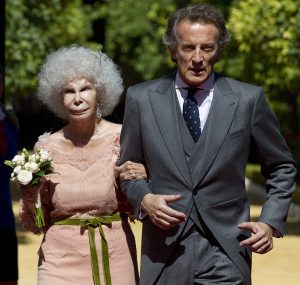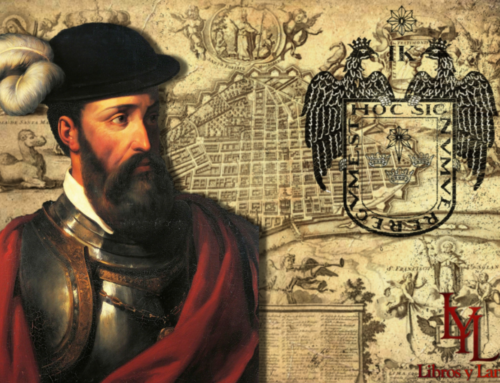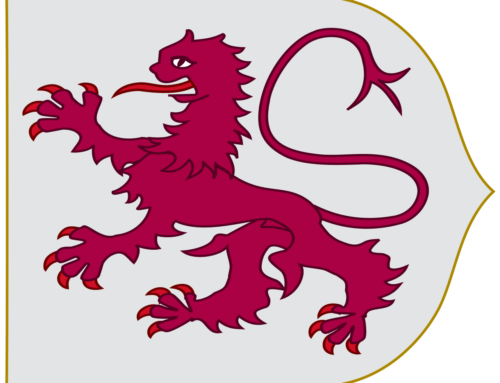The best known duchess in Spain, probably Europe too, has died after a long life (1926 – 2014) and a short but fatal illness. She was Cayetana, made 18th Duchess of Alba in 1954 after the death of her father the Duke. At the beginning of the Spanish Civil War the Albas had left Spain to live in London, where the Duke was Ambassador until the Treaty of Lausanne.
The new Duke of Alba is Carlos Fitzjames-Stuart, a prematurely white-haired, serious man, separated from his wife, is in his late fifties; he became Duke of Huescar when his mother was named duchess. The white hair might possibly have come about because Carlos’ mother led an extraordinary life, speaking several languages, being much loved by the ordinary people of Sevilla; at the slightest opportunity she would, even in her eighties, throw up her arms in flamenco movements and ululate on the pavement, observed with love by her third and last husband Alfonso Diez, and a certain gloom by her oldest son. Her first husband was another aristocrat, Luis Martínez de Irujo, with whom she had six children, all boys until the last. They are Carlos, Alfonso, Jacobo, Fernando, Cayetano and Eugenia. All have dukedoms. Cayetana had more titles than any other grand aristocratic family in Europe. This privileged position used to be held by another grand duchess, that of Medinaceli, who had more than ninety, but many were lost during the Second Republic, while others simply expired.
The Anglo-Scottish surname is easily explained. James VII of Scotland and II of England, King Charles II’s younger brother, had affairs, like all Stuarts, with many ladies not his wife. Among these was Arabella Churchill and the couple produced an illegitimate son who became Duke of Berwick. Cayetana was descended from this man, later legitimized, indeed one of her nearly forty titles is that of Berwick.
The 3rd Duke of Alba (1507 – 82) was a feared soldier and noted diplomat. He served with Holy Roman Emperor (q.v.) Charles V in Germany, fighting the Protestant princes, distinguishing himself at the Siege of Metz. With Philip II of Spain his three significant commands were (1) in the Italian Wars against a Pope (Paul IV), (2) in the army of Flanders and (3) the conquest of Portugal (1580).
In the Low Country wars he was sent to deal with Dutch resistance, and did so, perhaps with too much brio; to this day Dutch mothers of young children will threaten to ‘call in the Duke of Alba‘ in the event of their being troublesome. He set up a ‘tolerance zero’ hardline through his Council of Blood, and his harsh policies and fierce military campaigns against the ‘rebels’, plus his new centralized taxes aggravated rather than calmed the revolt. He was quite unable to quell it militarily, and his over-the-top methods started the scandalous Eighty Years War (q.v.) in 1568. He was recalled by the Spanish Crown in 1573, and then forced out of retirement to lead the successful occupation of Portugal.
Newly deceased Cayetana has been described as ‘frivolous’, especially by the colourful and mendacious Spanish press, and it is true that she was a dab hand at publicity. Nevertheless she always got her way, and was especially firm with her children, only beginning a distribution of her fabulous wealth before marrying for the third time. She was undoubtedly popular with ‘the common people’ especially in Sevilla, where she breathed her last in her Casa de las Dueñas. The Alba Palace of Liria in Madrid, lovingly and faithfully maintained by her chief administrator – Carlos, as well as the innumerable other palaces and castles spread across Spain, is a national monument, containing priceless works of art. In her last years the Duchess was subjected to a number of facial operations, none of which was successful, destroying the face of one of the most beautiful women in Spain. It must be said that she was a willing volunteer, but the yellow press has for years delighted in publishing appalling pictures of her. Publication of her ‘new look’ did not seem to worry her in the least, though captions to the photographs were often cruel.














Leave A Comment